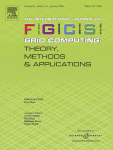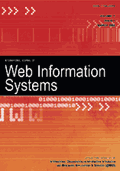 |
Future Generation Computer Systems: The International
Journal Of Grid Computing: Theory, Methods And Applications Special issue of
International Journal Of Grid Computing: Theory, Methods And
Applications will be published with extended versions of the
best papers from WEBIST in the area of Grid Computing.
The Grid is a rapidly developing computing structure that
allows components of our information technology
infrastructure, computational capabilities, databases,
sensors, and people to be shared flexibly as true
collaborative tools. Over the last 3 years there has been a
real explosion of new theory and technological progress
supporting a better understanding of these wide-area, fully
distributed computing systems. After the advances made in
distributed system design, collaborative environments, high
performance computing and high throughput computing, the
Grid is the logical next step.
The new Aims and Scope of FGCS will cover new
developments in:
[1] Grid Applications and application support:
- Novel applications
- eScience and eBusiness applications
- Problem solving environments and virtual laboratories
- Grid economy
- Semantic and knowledge based grids
- Collaborative Grids and virtual organizations
- High Performance and high throughput computing on grids
- Complex application workflows
- Scientific, industrial and social implications
- Grids in education
[2] Grid methods and middleware:
- Tools for grid development: monitoring and scheduling
- Distributed dynamic resource management
- Grid- and web-services
- Information management
- Protocols and emerging standards
- Peer to peer and internet computing
- Pervasive computing
- Grid Security
[3] Grid Theory:
- Process specification; program and algorithm design
- Theoretical aspects of wide area communication and
computation
- Scaling and performance theory
- Protocol verification
|
 |
International Journal of Web Information Systems
Special issue of IJWIS published in early/mid 2007 with
extended versions of the best papers from
ICEIS and
WEBIST in the area of Internet Computing.
Final accepted papers must be written in LaTex as this
is the only format accepted by our publisher. Further
details can be found in www.troubador.co.uk/ijwis/
The era of web technology has enabled information and
application sharing through the internet. The large
amount of information on the internet, the large number
of users, and the complexity of the application and
information types have introduced new areas whereby
these issues are explored and addressed. Many of the
existing information systems techniques and methods for
data sharing, modeling, and system implementation are no
longer effective and therefore need major adjustment.
This has stimulated the emergence of web information
systems.
The goal of a web information system is to provide users
with a unified view to transparently and efficiently
access, relate, and combine data stored in multiple,
autonomous, and possibly heterogeneous information
sources.
Three dimensions can be identified for web information
infrastructure: the user dimension, which is what web
information systems are all about, likewise, the content
dimension, which is the essence around which web
information systems are built and finally the system
dimension which determines how web applications and
services can be implemented.
IJWIS is seeking to present visionary concepts and
stimulating ideas in web information systems at both the
theory and application levels.
While IJWIS covers a broad range of topics, we are
soliciting papers that provide a perspective on all
aspects of the Web information systems: Web semantics
and web dynamics, Web mining and searching, Web
databases and web data integration, Web-based commerce
and e-business, Web collaboration and distributed
computing, Internet computing and networks, Performance
of web applications, and Web multimedia services and
web-based education.
Topics of particular interest for this issue are, but
not limited to, the list below:
• Metadata and ontologies
• Web semantics architectures, applications and
standards
• Language and representation issues of web semantics
• Migrating existing information
• Web mining
• Web search and information extraction
• Web structure/linkage mining
• Applications of web mining and searching
• Web databases
• Managing and storing XML data
• Generation of XML data from legacy applications
• Indexing and retrieval of XML data
• Web data integration
• Web schema management
• Web media
• Web design metrics
• Web-based metacomputing
• Communities on the web
• Formal reasoning about web dynamics
• Web-commerce and E-business
• E-Business models and architectures
• Agent technology for E-Commerce
• E-Business application case studies
• Workflow architectures in support of collaboration
process
• Establishment and coordination of virtual enterprises
• Emerging interoperability standards
• Internet quality of service
• Internet traffic engineering
• Mobile computing for the Internet
• Performance of web applications
• Web-based education
• Advanced web applications |



